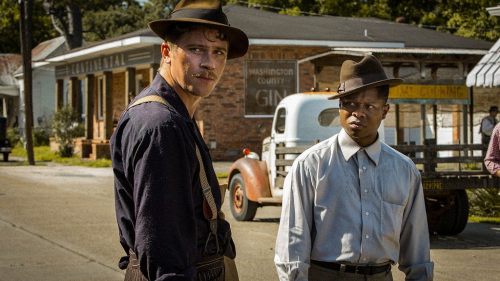NYFF Review: THE LOST CITY OF Z Boldly Brings Adventure Back To Cinema
The Lost City of Z is a film about our history, but what exactly that means is multifaceted. Set in the early days of the 20th century, it chronicles the Amazonian explorations of British officer Percy Fawcett, during a time period that happens to coincide with the birth of cinema. Films about Fawcett date back as early as 1933, but Z isn’t a film about the history of cinema, at least not directly. It does however have an acute awareness of how adventure has functioned as a cinematic genre, ever since its inception. Using this language, James Gray crafts a film that is distinctly old-world, from its narrative structure to its sublime 35mm presentation, but historically, it goes back even further. Not only is it about Fawcett’s ill-fated search for an ancient city of gold, the kind of archeological marvel that would fill entire gaps in human history, it’s also about the drive for exploration itself, a thirst for adventure born eons ago, making up who we are at our core.
A stark departure from its source material, David Grann's The Lost City of Z: A Tale of Deadly Obsession in the Amazon, the film foregoes Grann's retracing of the explorer's footsteps, and allows us to experience unfolding of history alongside Fawcett himself. Charlie Hunnam plays the ignobly born Percy Fawcett, a man trying to make a name for himself despite his father’s reputation. His achievements are cut short at every turn thanks to his sniveling peers and superiors, and once his request for armed action is firmly denied, he’s tasked with a cartographical mission to parts of the Amazon where no man has been, at the very least no white man, and so his fascination begins. All sorts of derisive terms have been used to describe Hunnam’s acting in the past, and the pride many such as myself found in defending him will likely be strengthened with his evocative turn as a classic leading man. He brings gravitas and melancholy and sheer triumphant sprit to the role of Percy Fawcett, a role where he’s allowed not only an old-school bravado, but the opportunity to shed it. When a war injury seems like it might permanently impede his attempts to return to the Amazon, Hunnam lies broken, defeated, and temporarily blinded, reaching out for a family he’s estranged with his obsession, and it’s utterly heartbreaking.
Joining Hunnam is a cavalcade of great performances, from Robert Pattinson’s meticulous Henry Costin, an eccentric Corporal who becomes Fawcett’s ally over his decades spent returning to explore the Amazon, to Angus Macfadyen’s James Murray, the selfish biologist who accompanies them to the Peruvian-Bolivian border until he draws a firm line between adventure and what he perceieves as madness, to Tom Holland as Fawcett’s scorned, strongheaded son, whose rebellion against his father soon gives way to rebellion alongside him, carrying forth his adventurer spirit. Even the minor roles are populated by a boastworthy cast, from Harry Melling (Harry Potter’s Dudley Dursley) as a slimy historian with an ethnocentric agenda which eventually gives way to faith in Fawcett’s exploits, and Ian McDiarmid (Emperor Palpatine himself) as one of the comissioners of Fawcett’s early expeditions, forced to balance the practical aspect of this journey with its broader, perhaps even more idealistic implications.
The film has no qualms about the racial and gender politics of the era. They’re by no means a central focus, but Gray is able to contextualize them lest this classic tale fall back on undesirable elements of classic conventions. It is after all a story of colonialism, and while Fawcett is neither concerned with the liberation of the “Indians” of South America nor the elevation of his wife’s status, his discomfort with the enslavement of the former is placed alongside his adamance surrounding his wife’s place in society, making him neither outright hero nor villain. The latter is no doubt rooted in care for protecting his family – Sienna Miller risses to the complex task of playing his wife and his foil; a believer in his belief but a voice of reason to his madness – yet he’s adamant nonetheless, and the film presents his perspectives on both Indians and women as completely grounded in its central philosophy, i.e. exploration at all cost, but while constantly articulating what that cost might be. Regardless of their moral leanings, these are but additional layers of Fawcett’s adventurous obsession. While concerned with the optics of enslavement, he’s indifferent to its actual outcomes so long as he can get what he wants. Or rather, so long as he can get where he’s going.
Cinematographer Darius Khondji (Amour, Midnight In Paris) receieved a thunderous ovation at the film’s premiere, perhaps the loudest of this year’s New York Film Festival, and rightly so. Z is a film that belongs on celluloid. While certainly dependent on the print in question, it’s painted on a fine-tuned canvas that, at its optimum, feels as new and exciting as exploration itself, hiding mysteries in its shadows while revealing them through light, but it’s faded enough to feel like a relic from just before our time. It captures both the vivid green hues of Amazonia, its trees and its plants and its unknown waters, along with warm and earthly tones brought to it by human beings, be it muddied colonial uniforms or primitive fires. These elements that ordinarily clash are married together with precision, allowing humanity and nature to co-exist in a dream-like state, even while humanity is at war with itself.
The film’s immaculate design and near-mythic approach to its surroundings bring to mind Apocalypse Now, the obvious comparison given each film’s subject matter, but a relevant one as The Lost City of Z plays like a direct, life-affirming response. Not only does it strip away the fantasy element of what we normally associate with adventure films (that’s not a knock on Indiana Jones, merely a return to what came before it), but it posits exploratory obsession as a central tenent of the human condition, as opposed to some sort of affliction. And when that realization is reached, not in words, but in Fawcett’s acceptance of exploration and all that it entails, he learns to truly give himself over to adventure.
Both Hunnam and the film are simply intoxicating, and The Lost City of Z builds to a surreal apotheosis of all the elements that make cinema great. A medley of sound and light and theme and character, built upon two hours of subtle yet consistent escalation in every facet, resulting in what might be the most haunting, harrowing and poetic final minutes of any picture in recent memory. It isn’t just the kind of film that draws you in, further and further with every scene, but the kind that keeps you there long after it’s over.



